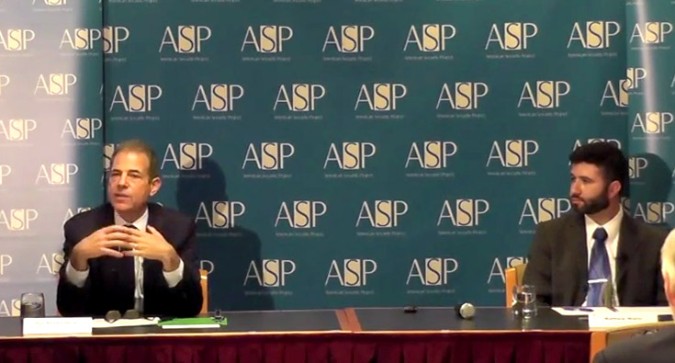
Under Secretary Stengel – Public Diplomacy is a Conversation
Podcast: Play in new window | Download
Subscribe: Apple Podcasts | RSS
Giving his first comprehensive presentation on his view of public diplomacy, Under Secretary Richard Stengel spoke to an audience of prominent practitioners and academics at ASP on Tuesday, and addressed a variety of issues the United States faces in 2014 and beyond.
Mr. Stengel opened his remarks by discussing his long-standing involvement in the values and ideas of public diplomacy. During his tenure as managing editor of TIME, Stengel saw TIME’s mission as being “to explain America to the world, and the world to America.” Feeling that this was a fairly good definition of public diplomacy, Stengel explained that many of the issues he was “reckoning with” at TIME are the same issues he currently faces at the State Department. But the changes in the modern media landscape have caused it to become “exponentially more complicated.”
Explaining his general perception of how public diplomacy works today, Stengel said:
Public diplomacy is a conversation. It’s people talking to people—it’s not governments talking to people—it’s sometimes people talking to governments. And all of this new technology, particularly social media, enables this conversation to happen in a way it was never able to happen before…I want us to be in that conversation.
He continued:
In that conversation, our job isn’t to make people like us, or to persuade people that we’re right. It’s to tell people what our policies are, it’s to explain why we have come up with these policies, and then engage in a conversation.
Discussing the fall of the Berlin Wall and the end of the Cold War, Mr. Stengel noted that despite a general consensus that the ideological battle had been won, we are now seeing a re-emergence of history, blood, and borders. Freedom and democratic governments have been in decline in many areas around the world, and the U.S. needs to reckon with this reality.
Commenting on the Internet’s role in public diplomacy, Mr. Stengel felt “we were a little naïve” about the Internet, explaining that several governments have been successfully restricting internet access, and therefore limiting freedom of speech and information. While the Center for Strategic Counter Terrorism Communications is potent, much more needs to be done by the United States online.
With regards to the concern over Russian State media’s outreach in recent years, Stengel argued that Russia’s news is “nothing like what we think of as objective news.” He noted that the U.S. has started a Russian language “narrowcasting” messaging service designed to reach individuals on specific platforms, and that he sees the situation as a competition for “swing voters.” Though an audience member challenged the U.S. interpretation of the situation in Ukraine, Stengel staunchly argued:
The thing that is absolutely indisputable, is that Russia violated the territorial integrity of an independent nation…Russia violated these norms that we have considered universal.
In addition to addressing many of the direct challenges in America’s public diplomacy efforts, Mr. Stengel also spoke on the concept of soft power.
…As we all know public diplomacy is soft power…we need to do more to harden our soft power. That’s not to say that so many of the parts of public diplomacy don’t matter. Educational exchanges are the gold standard of people to people diplomacy, they have long term benefits that are incalculable, and it’s wonderful. But in the short term, there needs to be a hardening of that soft power landscape.
In answering an audience question about addressing the threat of ISIL and the perceived “battle of ideas” in which the U.S. appears to be engaged, Stengel contended:
I would say that there is no battle of ideas with ISIL. ISIL is bereft of ideas—they’re bankrupt of ideas. It’s not an organization that is animated by ideas. It’s a criminal, savage, barbaric organization—I feel like we won that battle already. Their ability to recruit fighters has to do more, I would say, with conditions we don’t control: economic conditions in the Arab world, the ability for individuals to be empowered in the Arab world.
Concluding the event and returning to the issue of social media, Stengel commented on the use of social media as a tool by all actors in the communications realm:
…These tools can be used by anybody. We’re trying to use them for positive engagement—for empowerment. But it does empower the bad guys as well, and that is in many ways one of the biggest challenges, if not the biggest challenge for public diplomacy and public affairs in the 21st century.







[…] Under Secretary Stengel – Public Diplomacy is a Conversation […]
You are absolutely wrong. Public diplomacy IS about making people like us! That’s the whole point. You want to “Harden” a soft power? Then use it to convince people! You want to use it to undermine ISIL? Then attack their ideology. Don’t just write them off, they are recruiting people from around the world who have economic futures. You can’t do that without tapping into some form of ideological power. You need to be getting up every morning and looking at making more people like this country. Yes converse with them, but do more than just explain things. Your department should be an advocate not an information desk!
[…] of State for Public Diplomacy, made the case for soft power. He told a packed audience at the American Security Project his office faces challenges as momentous, but far more complex, than any the United States has seen […]
[…] of State for Public Diplomacy, made the case for soft power. He told a packed audience at the American Security Project his office faces challenges as momentous, but far more complex, than any the United States has seen […]
[…] issues facing practitioners of public diplomacy at State Department in remarks at a meeting of the American Security Project on 16 September. Excerpts from Stengel’s discussion and video (51:44) […]